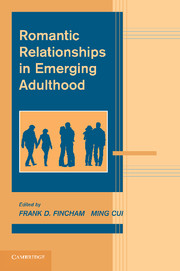Book contents
- Frontmatter
- Contents
- List of Contributors
- Foreword
- PART I INTRODUCTION
- PART II CONCEPTUAL AND METHODOLOGICAL FOUNDATIONS
- PART III THE DEVELOPMENTAL CONTEXT OF ROMANTIC RELATIONSHIPS IN EMERGING ADULTHOOD
- PART IV RELATIONSHIP PROCESSES IN EMERGING ADULTHOOD
- PART V PRACTICAL IMPLICATIONS
- 14 Romantic Relationships and Mental Health in Emerging Adulthood
- 15 Relationship Education in Emerging Adulthood: Problems and Prospects
- 16 Romantic Relationships and Academic/Career Trajectories in Emerging Adulthood
- Index
- References
14 - Romantic Relationships and Mental Health in Emerging Adulthood
Published online by Cambridge University Press: 06 December 2010
- Frontmatter
- Contents
- List of Contributors
- Foreword
- PART I INTRODUCTION
- PART II CONCEPTUAL AND METHODOLOGICAL FOUNDATIONS
- PART III THE DEVELOPMENTAL CONTEXT OF ROMANTIC RELATIONSHIPS IN EMERGING ADULTHOOD
- PART IV RELATIONSHIP PROCESSES IN EMERGING ADULTHOOD
- PART V PRACTICAL IMPLICATIONS
- 14 Romantic Relationships and Mental Health in Emerging Adulthood
- 15 Relationship Education in Emerging Adulthood: Problems and Prospects
- 16 Romantic Relationships and Academic/Career Trajectories in Emerging Adulthood
- Index
- References
Summary
In the not too distant past, it was thought that youth were not as susceptible as adults to mental health problems. Indeed, there was a time when it was believed that young people, especially children, were not even capable of experiencing significant psychopathology, such as depression (see Bemporad & Wilson, 1978). However, recent trends have made clear that not only can youth experience psychopathology but also that they do so at alarmingly high rates. For instance, recent estimates indicate that at least one third of adolescents have experienced a diagnosable disorder in their lifetime (Lewinsohn, Hops, Roberts, Seeley, & Andrews, 1993), as have nearly 60% of emerging adults (Kessler, Berglund, et al., 2005).
It also was thought, fairly recently in fact, that romantic relationships in youth were not particularly important or formative. As Brown, Feiring, and Furman (1999) note in their seminal volume, researchers had “missed the love boat,” holding on instead to outdated ideas about youth romance. Recent trends have made clear that romantic relationships in youth are indeed important and formative. A growing body of research suggests that the romantic domain of youth's lives is prominent, affects how young people view the self, and is marked by intense emotional ups and downs (e.g., Connolly & Konarski, 1994; Larson, Clore, & Wood, 1999). The high rates of youth dating aggression attest to the serious dysfunction that can occur in the romantic lives of adolescents, which has the potential to have significant negative consequences (see Lewis & Fremoux, 2001).
- Type
- Chapter
- Information
- Romantic Relationships in Emerging Adulthood , pp. 275 - 292Publisher: Cambridge University PressPrint publication year: 2010
References
- 1
- Cited by

